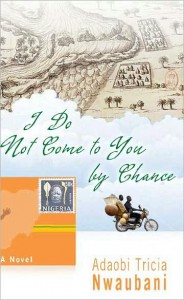I Do Not Come to You by Chance Review
 I had to go four or five pages into my junk email folder to notice one. It was from a Dr. Obadiah Maliafia of the Central Bank of Nigeria. The email says that my $10.7 million in overdue inheritance funds: "HAS BEEN GAZZETED TO BE RELEASED TO YOU VIA THE Strange REMMITANCE DEPARTMENT OF OUR Bank."
I had to go four or five pages into my junk email folder to notice one. It was from a Dr. Obadiah Maliafia of the Central Bank of Nigeria. The email says that my $10.7 million in overdue inheritance funds: "HAS BEEN GAZZETED TO BE RELEASED TO YOU VIA THE Strange REMMITANCE DEPARTMENT OF OUR Bank."
After reading Adaobi Tricia Nwaubani'south debut novel I Practice Not Come to Yous By Chance (Hyperion, May 2009), the cannonball from Dr. Maliafia read like a finely tuned slice of art: the formal language, the capital letters, the corporeality of money – a perfect example of the 419 email scam.
Referenced past their Nigerian penal code number, the 419 scam – otherwise known equally the Nigerian alphabetic character, the Spanish Prisoner or merely advance-fee fraud – operates on the idea that the scam creative person has run into a large corporeality of coin that they need your help, i.e., Western bank accounts and citizenship, to access. In render, the bankers or deposed Nigerian royalty will reward you for your assistance with much more than your off-white share. Showtime in the 1980s with the decline of Nigeria'southward once oil-rich economy, the 419 email scam has become the stuff of legends. My favorite popular culture reference is when Michael Scott, Steve Carell's bumbling grapheme on NBC'due south The Part, admits his own dupe by saying: "When the Prince of Nigeria contacts you directly, yous don't ask questions; you aid where you can" (Season 2, Episode 19).

Adaobi Tricia Nwaubani / photo from http://world wide web.african-writing.com/nwaubani.htm
In I Do Non Come up To You By Gamble, Nwuabani reveals the larger-than-life characters, impressive operations and greedy westerners that make up both sides of the 419 business – often with her tongue planted firmly in cheek. She equally sends up both the Nigerian money men and the over-privileged mugus (or scam targets), making information technology impossible to claim either side.
Kingsley, Nwaubani's young protagonist, isn't a born grifter. In fact, the novel chronicles Kingsley'south gradual surrender to a life of crime, which is in strict opposition to the style his pious, England-educated, ceremonious servant male parent raised him. Y'all know, the kind of father who asks questions similar: "Practise you want to end upwards selling pepper and tomatoes in Nkwoegwu market?" Though Kingsley is higher educated, the economic and employment crisis has left him without resource. A family tragedy forces him into the world of his Uncle Boniface, otherwise known as Cash Daddy, a 419 kingpin.
It's a classic set-up for a morality tale. Nwaubani'southward brusque capacity and grueling descriptions of some of Nigeria's discomforts, namely public send and the health care system, virtually seem Dickensian. But the strength of the novel becomes apparent when the proficient versus evil stardom begins to blur – especially for Kingsley. The narrative soars when Kingsley is detailing the 419 work of Cash Daddy's inner circle – a much more complicated and process than I could take imagined. In this world, a gullible mugu deserves no sympathy. When Kingsley expresses incertitude to his uncle, Cash Daddy responds: "Do yous know this is the man whose money is going to feed your children and your children's children and your children's children'southward children?"
In fact, in the second half of the book, I found myself cheering Kingsley on – hoping he'll snare some greedy, lonely mugu in Center America: Mirabelle, the woman from Wisconsin spending her house-ownership savings to get a piece of $19 million, or the strange businessman looking to invest millions in Nigeria for an fifty-fifty greater return. Nwaubani's gleefully crafted emails were some of my favorite moments in the book.
Kingsley'southward skill at duping people is humorous, merely Cash Daddy steals the show – not to mention a few appearances by other Nigerian bigwigs with names like World Bank and Money Magnet. A pastiche of Marlon Brando's Vito Corleone and Wood Whitaker'due south Idi Amin – Cash Daddy is at in one case frightening, disgusting and caring. Whether he's devouring a meal with his hands, quoting the Bible or taking a meeting while defecating – the character narrowly escapes being over the top. Yet, equally much equally Nwaubani relishes in Cash Daddy'due south ridiculousness, his relationship with Kingsley brings him solidly down to globe.
Nwaubani'south insists on a gradual fix-upward (about 200 pages) starting as far dorsum every bit Kingsley's parents' courtship, to institute Kingsley and his immediate family as the type who don't curve to whatsoever scam. The first half of the volume also features Kingsley's tedious interruption-up with his higher sweetheart Ola, because of financial reasons – a storyline that could take been told through ane anecdote not four or five. Even though Nwaubani's writing is engaging, it starts to feel like also much of a set and I found myself skimming sections in order to get to the fun.
The book's marketing compares Nwaubani – who grew up and continues to alive and write in Eastern Nigeria – to second generation, immigrant writers like Monica Ali, Kiran Desai and Lisa See. The comparison is all wrong. Nwaubani's debut points to the fact that there are international writers writing in English who are non focused solely on the Diaspora experience, but are instead shedding light on international bug from inside their countries.
Farther Resource
– Read "We Have Decided to Help," a brusk story by Nwaubani, online here.
– At African Writing Online, read this interview with Adaobi Tricia Nwaubani. And via the via the Cassava Democracy blog, hear Nwaubani read from her work and do a Q&A.
– Find out more well-nigh 419 e-mail scams and run across a whole anthology of samples here at Fight Identity Theft.
Source: https://fictionwritersreview.com/review/i-do-not-come-to-you-by-chance-by-adaobi-tricia-nwaubani/
Post a Comment for "I Do Not Come to You by Chance Review"